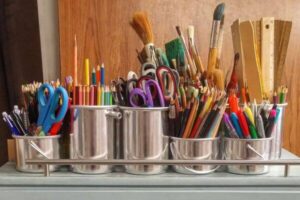Literature, the exquisite tapestry of human expression, is a gateway to new worlds and a mirror reflecting our innermost thoughts and emotions. It serves as a timeless medium through which we communicate, learn, and grow as individuals. The art of weaving words together, known as “wordsmithing,” is a skill that has the power to transform us, enabling us to become more eloquent, empathetic, and perceptive beings. In this article, we will delve into the world of nurturing literary excellence in learning, exploring the importance of wordsmithing and offering valuable insights on how to cultivate this skill.
The Art of Wordsmithing
Understanding Wordsmithing
Wordsmithing is the craft of using words to convey ideas, emotions, and information effectively. It encompasses various forms of written and spoken expression, including poetry, prose, essays, speeches, and more. A skilled wordsmith can wield language in a way that captivates, informs, and inspires their audience. This art is not confined to professional writers but is an essential skill for anyone who wishes to communicate with precision and impact.
The art of wordsmithing invites us to become architects of language, where words are the building blocks of our ideas, emotions, and stories. It’s a powerful tool that allows us to construct bridges of understanding and empathy, transcending boundaries of time, culture, and geography. The magic of wordsmithing is that it can be applied in all aspects of life, from crafting a compelling business proposal to writing a heartfelt letter to a loved one.
The Power of Words
Words, ordinary symbols, have an extraordinary power to shape the world around us. They can persuade, motivate, and unite people. They can also provide solace, healing, and understanding. Think of iconic speeches like Martin Luther King Jr.’s “I Have a Dream,” or the timeless prose of Shakespeare. These wordsmiths transformed the course of history, proving that the art of wordsmithing can be a formidable tool for change and inspiration.
Our daily lives are inundated with words, from the books we read to the conversations we have, the advertisements we see, and the messages we receive. Understanding the power of words allows us to navigate this sea of information more effectively, discerning between rhetoric and truth, and appreciating the beauty of well-crafted language.
Nurturing Literary Excellence
Reading Widely
One of the fundamental steps in nurturing literary excellence is reading widely. Reading exposes us to different writing styles, genres, and perspectives. Whether you prefer classic literature, contemporary fiction, non-fiction, or poetry, reading expands your vocabulary and hones your understanding of language.
As you dive into various literary works, you embark on a journey through time, culture, and imagination. You can explore the vivid realms of fantasy, immerse yourself in historical eras, or gain insight into the human condition. Reading widely allows you to experience diverse voices and perspectives, cultivating empathy and a broader understanding of the world.
Writing Practice
Practice makes perfect, and writing is no exception. Regular writing practice is essential for nurturing your literary skills. Start with journaling, short stories, or essays, and gradually work your way up to more complex forms of writing.
Moreover, writing is not just about putting words on paper; it’s a process of self-discovery and expression. It allows you to unravel your thoughts, channel your emotions, and crystallize your ideas. Through writing, you become the architect of your own narrative, shaping your unique perspective on the world.
Embracing Feedback
Constructive feedback is an asset in the journey of becoming a wordsmith. Share your work with others, join writing groups, or seek out writing workshops to receive insights from fellow writers. Critique, when delivered thoughtfully, can help you identify areas of improvement and refine your literary skills.
Feedback is a mirror that reflects your growth as a writer. It illuminates your strengths and highlights areas for improvement. Embracing feedback is an act of humility and a commitment to constant growth and refinement in your craft.
The Role of Education
Formal Education
Many individuals pursue formal education in literature or creative writing to deepen their literary knowledge and skills. Enrolling in courses, attending workshops, or pursuing degrees in literature and creative writing can provide structured guidance and opportunities to interact with experienced mentors and peers.
Formal education offers a structured path for those who are passionate about wordsmithing. It provides a platform to study literary theory, explore different writing styles, and receive guidance from experienced instructors. It can also be a place for aspiring writers to connect with like-minded individuals, fostering a supportive community.
Online Resources
In the digital age, there is an abundance of online resources available to aspiring wordsmiths. Websites, blogs, and YouTube channels offer writing tips, prompts, and tutorials. Online courses and webinars provide access to experts in the field, making it easier than ever to embark on a literary journey from the comfort of your own home.
Online resources offer flexibility and accessibility, allowing individuals from all levels of society to pursue their passion for wordsmithing. They also provide a wealth of information on various aspects of writing, from grammar and style to publishing and marketing. Whether you’re a novice or a seasoned writer, online resources are a treasure trove of knowledge waiting to be explored.
Libraries and Literary Events
Libraries remain a treasure trove for wordsmiths, offering an extensive collection of books, periodicals, and literary journals. They often host literary events, author talks, and writing workshops, providing opportunities for connection and inspiration.
Libraries are sanctuaries of knowledge, where the past and the present converge. They offer a tranquil space for reading, research, and reflection. Literary events in libraries create a bridge between readers and writers, fostering a sense of community and shared passion for words.
Attending book launches, literary festivals, and writer’s conferences can also be beneficial for networking and staying informed about the latest trends in literature. These events provide a platform for writers to connect with their audience, gain exposure, and exchange ideas with fellow wordsmiths.
Crafting an Authentic Voice
Self-Expression
To excel as a wordsmith, it’s crucial to find and develop your authentic voice. Your voice is the unique way in which you express your thoughts and emotions. It’s the distinct flavor that sets your writing apart from others. To discover your voice, write from your heart, be genuine, and embrace your individuality.
Finding your authentic voice is an ongoing process of self-discovery. It requires introspection, a deep understanding of your values, and an appreciation of your life experiences. Your voice is the fingerprint of your soul on the pages, and when you find it, your words become an extension of your essence.
Honing Your Style
Each writer has a distinct style characterized by their choice of words, sentence structure, and tone. Some writers favor simplicity, while others opt for ornate language. Honing your style involves understanding your preferences and refining your writing to create a signature that readers can recognize.
Your writing style is your artistic identity. It’s the brushstroke that distinguishes your canvas from others. Whether you gravitate towards poetic lyricism or crisp, straightforward prose, your style reflects your personality and your unique perspective on the world.
The Importance of Revision
The Iterative Process
Writing is an iterative process, and revision is an integral part of it. After you have written a piece, step away from it for a while to gain a fresh perspective. Return to your work with a critical eye, seeking areas for improvement in terms of clarity, coherence, and impact.
Revision is the chisel and the polish, shaping your raw creation into a masterpiece. It’s where your words are refined, polished, and perfected. The iterative process of writing and revision is a testament to the commitment of wordsmiths to their craft, continually striving for excellence.
Peer Review
Engage others in the revision process. Fellow writers, mentors, or editors can provide valuable insights and help you identify blind spots in your writing. A second pair of eyes can uncover errors and inconsistencies you might have missed.
Peer review is a collaborative dance in the world of wordsmithing. It’s an opportunity for collective growth, where the input of others can illuminate new paths of improvement. It’s a reminder that words are meant to be shared, appreciated, and improved upon by the community.
Literary Tools and Techniques
Figurative Language
Mastery of figurative language, such as metaphors, similes, and personification, adds depth and richness to your writing. These tools allow you to paint vivid imagery, evoke emotions, and create memorable prose. Carefully employed figurative language can elevate your wordsmithing to a new level.
Figurative language is the paint on the wordsmith’s palette. It allows you to create landscapes of emotion, portraits of vivid characters, and abstract concepts brought to life. Metaphors become bridges between the known and the unknown, similes add sparkles of familiarity, and personification breathes life into the inanimate.
Rhetorical Devices
Rhetorical devices, like alliteration, parallelism, and antithesis, can enhance the structure and rhythm of your writing. They create a musical quality in your prose or speech, making it more engaging and impactful. A well-placed rhetorical device can leave an impression on your audience.
Rhetorical devices are the notes and beats in the symphony of words. They add rhythm, emphasis, and melody to your writing. Alliteration can be a playful dance of consonants, parallelism can create a soothing repetition, and antithesis can introduce a thought-provoking contrast.
Conclusion
In a world driven by communication and information, nurturing literary excellence through wordsmithing is a valuable and relevant pursuit. Wordsmiths have the power to shape ideas, inspire change, and connect with others on a profound level. By understanding the art of wordsmithing, nurturing your literary skills, and continually refining your craft, you can become a masterful wordsmith capable of leaving a lasting impact through your words.
In summary, the journey to literary excellence involves:
- Understanding the art of wordsmithing.
- Reading widely to expand your vocabulary and understanding.
- Practicing writing regularly and embracing feedback.
- Exploring formal education and utilizing online resources.
- Crafting an authentic voice and honing your style.
- Embracing the importance of revision.
- Mastering literary tools and techniques.
Wordsmithing is not only a valuable skill for writers but for anyone looking to communicate effectively and leave a mark in the world. It is a lifelong journey of learning, growth, and self-expression. So, go forth, nurture your literary excellence, and let your words transform the world. In a world filled with words, become the wordsmith who makes them matter.

